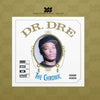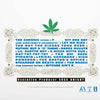



Dr. Dre - The Chronic (2LP, 1STEP, Etui)
ORDER LIMITED TO ONE ITEM PER CUSTOMER
Vocals, Synthesizers, Drum Programming (A1 to C1, C3 to D4) - Dr. Dre
Additional Vocals – Snoop (A1 to C3, D2, D4), Jewell (A2-3, D3), RBX (A2, A4, C2, C4-5, D2-3), Ruben (A3), That Nigga Daz (A4, B2-3, C4-5, D3-4), Nate Dogg (B2-3), Warren G. (B2), BJ (C2), Big Tittie Nickie (C3), Samara (C3), D.O.C. (C3), Kurupt (C4, D2, D4), Rage (C4 to D3), Jewell (D1, D4), Emmage (D3), Ruben (D3)
Bass Guitar, Bass Keyboard – Colin Wolfe
Flute, Saxophone – Katisse Buckingham
Guitar – Chris Clairmont, Eric [The Drunk] Borders
Keyboards – Colin Wolfe, Justin Reinhardt
Drum Programming – That Nigga Daz (C2)
Live Drums – Cheron Moore (D3)
Written by Dr. Dre (A1-2, A4, B2, C2 to D1, D4), Snoop (A1 to C4, D2, D4), Colin Wolfe (A1-2, B2, C5, D4), RBX (A3-4, C4-5, D2-3), Daz (A4, B2, D3), Dogg (B2), D.O.C. (B3, C1, C3-4, D4), Rage (C4, D1-3), Kevin Lewis (D1), Kurupt (D2, D4),
2LPs, Slipcase, Gatefold jacket by ASG / Spark
Limited to 3,000 numbered copies
Original analog Master Tape : YES
Heavy Press : Neotech VR900-D2 180g High-Definition Vinyl
Record color : black
Speed : 33RPM
Size : 12”
Stéréo
Studio
Record Press : Record Technology Incorporated
Label : Interscope Records - The Definitive Sound Series
Original Label : Interscope Records
Recorded in April–June 1992 at Death Row Studio, Los Angeles, California
Engineered by Greg [Gregski] Royal
Mixed by Chris [The Glove] Taylor, Dr. Dre, Greg [Gregski] Royal
Produced by Dr. Dre
Executive-Producer – Suge Knight
Design by Kimberly Holt, Unleashed
Mastered by Chris Bellman at Bernie Grundman Mastering
Photography by Daniel Jordan
Album Design by Jeri Heiden
Originally released in December 1992
Reissued in 2025
Tracks:
Side A:
- The Chronic (Intro)
- Fuck Wit Dre Day (And Everybody's Celebratin')
- Let Me Ride
- The Day Niggaz Took Over
Side B:
- Nuthin' but a "G" Thang
- Deeez Nuuuts
- Lil' Ghetto Boy
Side C:
- A Nigga Witta Gun
- Rat-Tat-Tat-Tat
- The $20 Sack Pyramid
- Lyrical Gangbang
- High Powered
Side D:
- The Doctor's Office
- Stranded on Death Row
- The Roach (The Chronic Outro)
- Bitches Ain't Shit
Awards:
Rolling Stone 500 Greatest Albums of All Time - Ranked 37 / 500
Reviews:
“You are advised on side 3 that 'This should be played at high volume preferably in a residential area!' And you can because it's a flat out audiophile quality G-funk production, more live in the studio music, than sample derived (fewer than a dozen samples, more than a few Funkadelic derived). The funk beats are slow, fat and hypnotic the bass lines sexy and languid and Dre leaves wide open spaces that help produce huge, three-dimensional soundstages. There's a live flute played by Katisse Buckingham that magically floats in space between the channels. Most of the live instruments are equally well recorded and presented. Not sure if Dre used Neumann U-47s but the vocals are so ridiculously well recorded and left to hang unmolested by effects you can almost smell the blunt breath.” Michael Fremer, Tracking Angle
“With its stylish, sonically detailed production, Dr. Dre's 1992 solo debut, The Chronic, transformed the entire sound of West Coast rap. Here Dre established his patented G-funk sound: fat, blunted Parliament-Funkadelic beats, soulful backing vocals, and live instruments in the rolling basslines and whiny synths. What's impressive is that Dre crafts tighter singles than his inspiration, George Clinton -- he's just as effortlessly funky, and he has a better feel for a hook, a knack that improbably landed gangsta rap on the pop charts. But none of The Chronic's legions of imitators were as rich in personality, and that's due in large part to Dre's monumental discovery, Snoop Doggy Dogg. Snoop livens up every track he touches, sometimes just by joining in the chorus -- and if The Chronic has a flaw, it's that his relative absence from the second half slows the momentum. There was nothing in rap quite like Snoop's singsong, lazy drawl (as it's invariably described), and since Dre's true forte is the producer's chair, Snoop is the signature voice. He sounds utterly unaffected by anything, no matter how extreme, which sets the tone for the album's misogyny, homophobia, and violence. The Rodney King riots are unequivocally celebrated, but the war wasn't just on the streets; Dre enlists his numerous guests in feuds with rivals and ex-bandmates. Yet The Chronic is first and foremost a party album, rooted not only in '70s funk and soul, but also that era's blue party comedy, particularly Dolemite. Its comic song intros and skits became prerequisites for rap albums seeking to duplicate its cinematic flow; plus, Snoop and Dre's terrific chemistry ensures that even their foulest insults are cleverly turned. That framework makes The Chronic both unreal and all too real, a cartoon and a snapshot. No matter how controversial, it remains one of the greatest and most influential hip-hop albums of all time.” AllMusic Review by Steve Huey
One Step. Instead of utilizing the industry-standard three-step lacquer process, one-step plating uses only one step, bypassing two processes of generational loss. One-step plating skip the regular father-mother process, going right to a single convert and then pressing. Though this dramatically increases mastering and production costs, it also assures each run is more consistent from disc to disc, with less noise, clearer details and deeper bass. Reducing production complexity to just a single "convert" disc between the lacquer and the press greatly improves groove integrity, diminishes non-fill anomalies and increases signal integrity from the master tape to your system.
Ratings:
AllMusic : 5 / 5 ; Discogs : 4.57 / 5 ; Michael Fremer : 9/11 Music, 10/11 Sound




